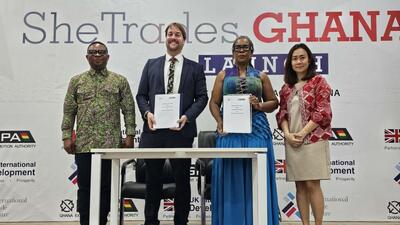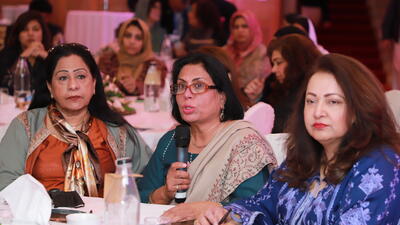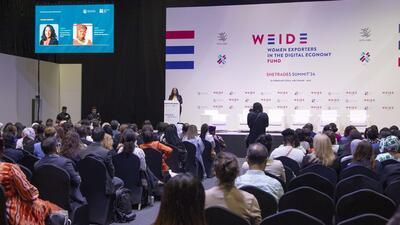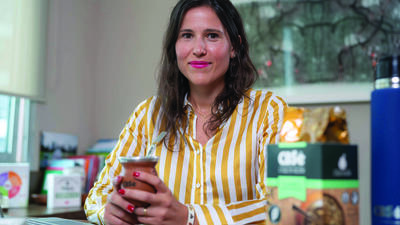

How Nyawa Chipalabela grew her flourishing jewellery business in Zambia
An interview with Nyawa Chipalabela, founder and CEO of Namayo Jewellery, and member of the ITC SheTrades Zambia project.
From the age of just eight years old, Nyawa Chipalabela knew that she wanted to become a professional jeweller. Upon completing her secondary education, Nyawa embarked on a journey to realize her entrepreneurial vision: to set up a jewellery studio which would train and employ women from marginalized communities. This meant using jewellery-making as a tool to help alleviate poverty and create jobs and better livelihoods for these women and their families.
Raised by her grandparents following the tragic loss of her parents in childhood, Nyawa initially aspired to pursue further education. But Nyawa then found that she needed a job to pay for her university fees, and no company would hire her without academic qualifications. Faced with this dilemma, Nyawa found herself at a crossroads. ‘So that was when I got thinking,’ ”Nyawa explains, ‘that doing something of my own is something I should explore.’
Gaining the necessary skills
Nyawa’s next step was to gain the necessary skills to turn her vision into reality. For women in Zambia, a lack of education makes this stage of business development vital. ‘When it comes to education, the focus is more on boys,’ says Nyawa. ‘I came from a very traditional home, and it was really a struggle. I had to be very adamant that I wanted to go to school. Always pushing. So, for the girls, we were raised with that belief that we're housewives and men will take care of us, whereas the boys were raised in such a way that they were going to be leaders.’
Nyawa's early training presented a long list of questions: ‘How then do you do a business plan? What about financial literacy? Without those basics, you end up being pushed into informal business. It’s hard. I remember one of the first training sessions that I did before accessing SheTrades. It was so intimidating because business has a language and some of the terminologies I really couldn't understand. Literacy is very important. If it was that hard for me, how hard would it be for other women who have never even been to school?’
How joining the ITC SheTrades Zambia project led to new funding
Nyawa was introduced by her former employer to the Zambia Development Agency (ZDA), a statutory body under the Ministry of Commerce, Trade and Industry, after her colleague had herself benefited from ZDA’s initiatives. Eager to grow her business, Nyawa contacted the agency, who introduced her to international initiatives that could support her as an entrepreneur.
Just a few weeks later, Nyawa was put in touch with the ITC SheTrades Zambia project to begin business training sessions. They covered topics including business planning and management, export readiness, financial literacy, investment readiness, e-commerce, packaging, and labelling. ‘By the time the training ended, I really understood and could pitch my business.’
Nyawa also found traditional funding difficult to access. ‘I did try with the banks, but as a start up, you don’t have the collateral needed, so most of the time I found that I couldn't qualify for the requirements.
Also, with the banks I approached, they were looking at my team, and they said that they didn’t really feel like we have the professional experience or skills for them to confidently give us the money.’
The opportunity came when Zambia’s Citizens Economic Empowerment Commission – a statutory body under the Ministry of Small and Medium Enterprises Development – put out a call for applications from businesses to receive funding. In September 2022, Nyawa applied and was awarded a loan.
'It was very competitive, but because of the training I had received from SheTrades on export and investment readiness, financial literacy and business planning, I was confident that I could write a compelling proposal,’ says Nyawa.
Taking Namayo global
Through the SheTrades Zambia project, Nyawa was connected to The Collective ZM. Her partnership with the collective took Namayo Jewellery to five physical stores – including one at the Kenneth Kaunda International Airport – as well as their e-marketplaces that reach customers in Africa, Europe and the United States. Nyawa also established a partnership with South Africa-based AfricArise, a virtual pan-African startup investor network platform, which landed her jewellery in stores across the country.
Nyawa hopes to tap into more partnerships to scale her business internationally. By 2029, she hopes to increase the number of women artisans employed from five (three full-time and two part-time) to 20.
'My small business has so far impacted 50 lives, including my employees and their households. Not only have I been able to send my children to school, but the women I employ can now afford education for their kids and access safe drinking water, food, clothing, health schemes and shelter.’
Nyawa’s advice to other women entrepreneurs looking to start a business is simple: 'Keep learning, understand your products, and find out what opportunities are being offered through local agencies. No business idea is too small!’
To discover opportunities offered through the ITC SheTrades Initiative, visit www.shetrades.com.
About ITC SheTrades Zambia
The SheTrades Zambia Project was implemented between 2019 and 2023 to enhance the economic and financial inclusion of Zambian women entrepreneurs and foster a gender-inclusive trade ecosystem in the country. Funded by the Enhanced Integrated Framework (EIF), ITC, and the Foreign, Commonwealth and Development Office (FCDO), the project has been implemented with the support of the Ministry of Trade, Commerce, and Industry (MCTI), and the Zambia Development Agency (ZDA). Over the past four years, the project has successfully established a community of key stakeholders and women entrepreneurs, delivering technical assistance on crucial topics related to market and export readiness. It has also facilitated new business and financial linkages for women, unlocking new opportunities for growth.






















